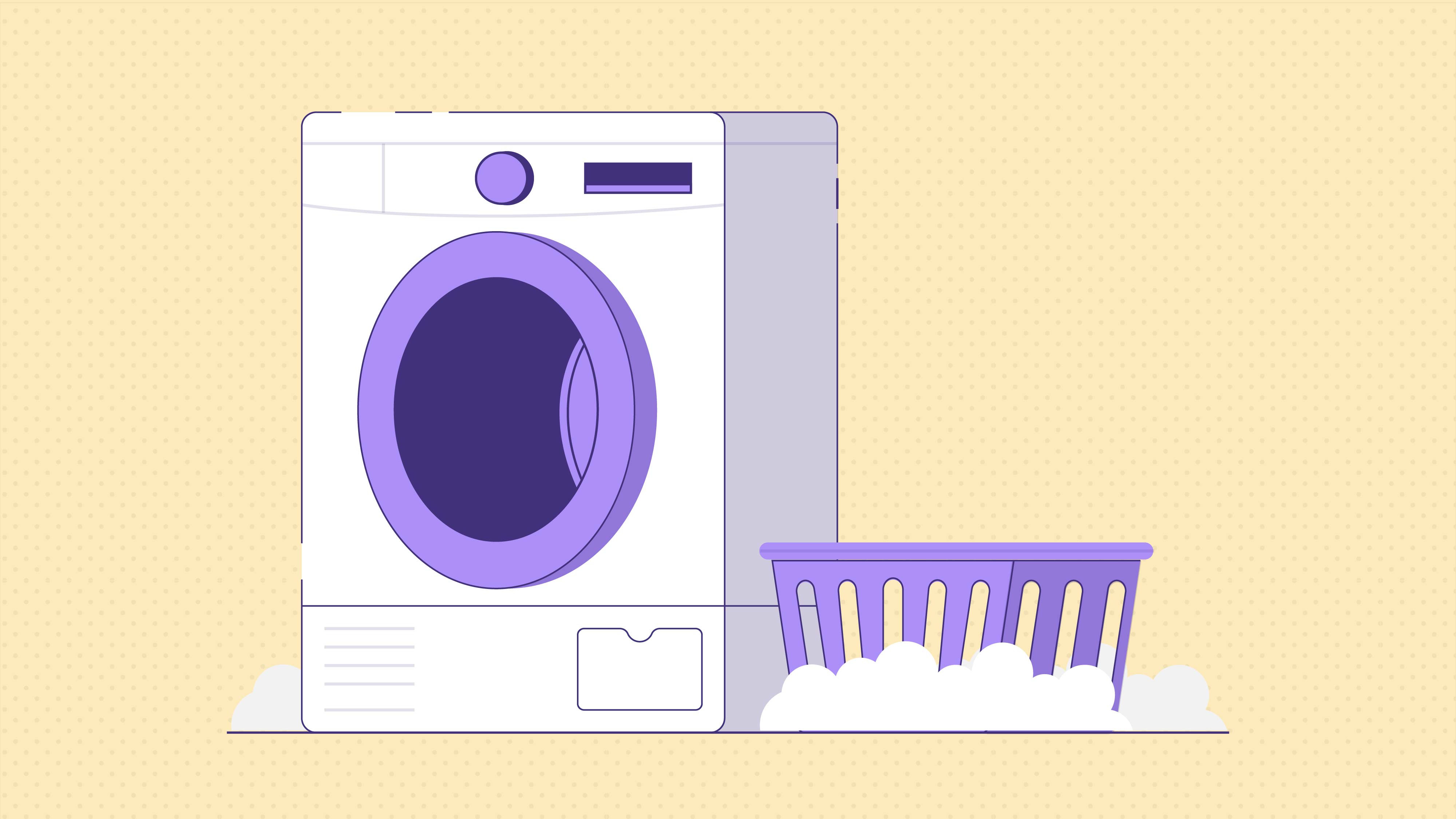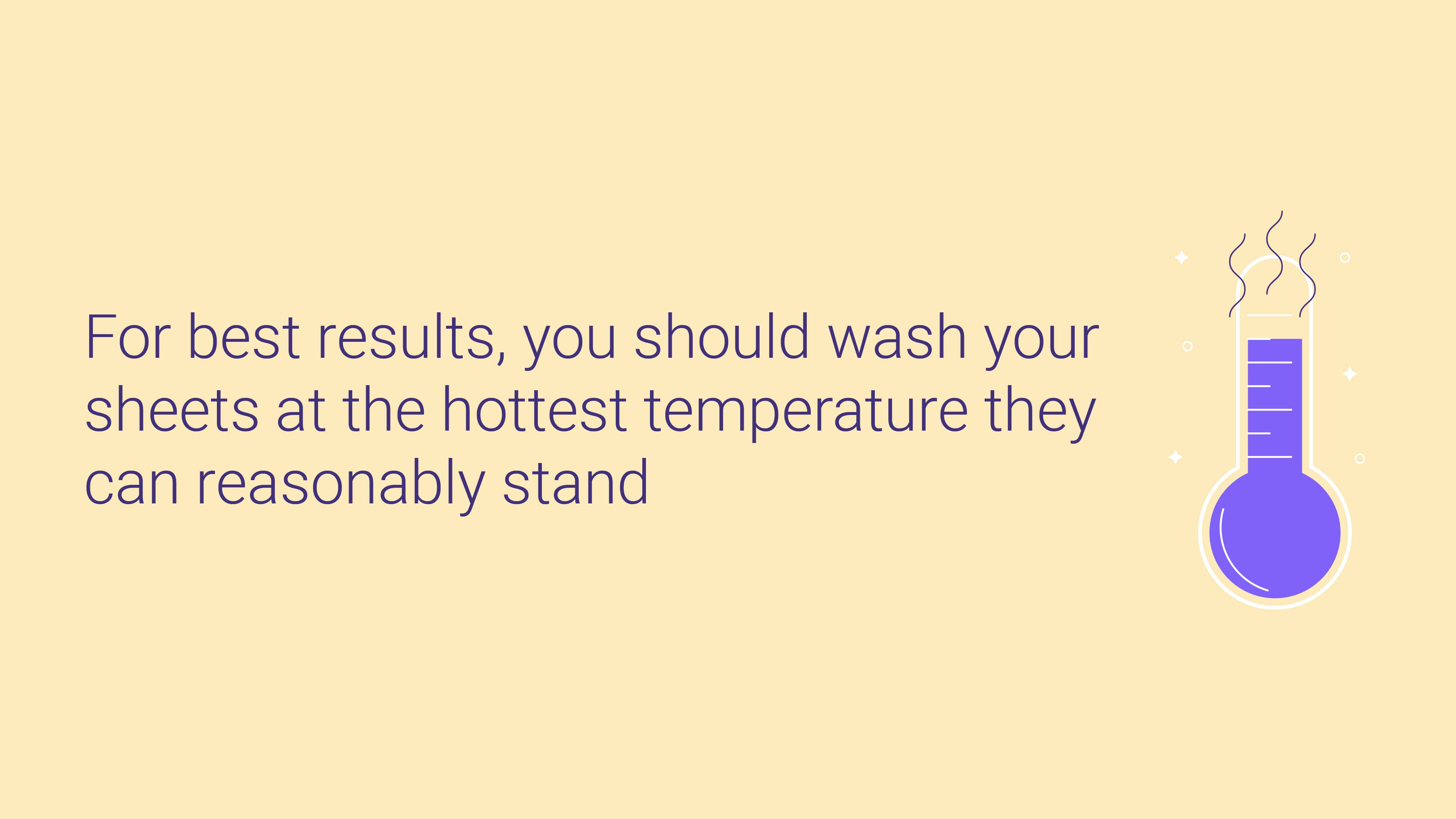
How Often Should You Wash Your Sheets?

According to a scientific study, you should wash your sheets once a week in hot water. The study was designed to find inexpensive, practical ways to lower dust mite allergens levels in homes.
Dust mites are tiny pests invisible to the naked eye. They feed on skin flakes and human or pet dander. A dust mite’s fecal matter contains proteins that can cause an allergic reaction.
Weekly washings might seem excessive to those of us who wash our bed sheets every two weeks or even once a month and still sleep comfortably. However, think about it this way: You wouldn’t want to wear the same clothes for more than a week without washing them. Why would you hold different standards for your sheets, which we essentially wear as a second set of clothes when we sleep through the night?
You might need to wash your sheets more often if you spend a lot of time outside before bed, don’t shower after a workout, or you experience a flare-up of allergy symptoms. During the summer, when many of us sweat during warmer nights, our bedding might need changing every two days.
You should also wash your bed sheets when you fall ill. Cleaning dirty sheets keep your mattress and bedding from becoming a hotbed of germs and spreading disease.
Exceptions to the Weekly Washing Rule
For the most part, all of your bed linens should be washed once a week. That includes blankets, top sheets, and fitted sheets. However, there are some bedding items that you should wash less often, or rarely, more than once a week.
Because pillowcases can absorb a lot of dead skin cells, sweat, and other debris, some experts recommend changing your pillowcase twice or even three times a week. Instead of running a midweekly load, you might want to double up on pillowcases and wash them weekly with the rest of your bedding.
Even the best pillows should be cleaned at least every six months. Machine washable pillows are the easiest to take care of, but you can freshen up a non-washable pillow with a sprinkling of baking soda.
Mattress pads and protectors don’t need to be washed every week because a lot of dirt, dust, and debris settles on the sheets covering them. Remove them once a month for a good cleaning and to eliminate dust mite attractors. If you use a pillow protector, you should also wash it once a month.
A duvet or comforter can be spared from a weekly washing if you keep it inside a duvet cover. Wash the cover every week with the rest of your bedding and wash the duvet insert once a season.
If you have a bed skirt or a canopy, you will want to eventually wash those items, too. If you regularly vacuum around them, you shouldn’t have to wash them more than every three to six months.
Many people like to keep two or three sets of sheets on hand so they don’t have to immediately wash their sheets. You fold up your fitted sheets, flat sheets, spare pillowcases and other items and keep them in a closet or storage container.
How Do I Wash My Sheets?
Most of us probably have an idea of how to clean our sheets with a washing machine. The question is, are you washing your sheets in the most effective way you can?

For best results, you should wash your sheets at the hottest temperature they can reasonably stand. Hot temperatures kill bacteria and dust mites, though the best temperature will depend on the sheets’ material. For example, you should usually wash polyester bedding in warm water, while cotton sheets can withstand higher temperatures.
Before you purchase a set of sheets, see if you can find out their care instructions. Not all sheets are machine washable, so it’s important to ask yourself if you are willing to invest a lot of upkeep in a set of sheets.
You should wash new sheets before you place them on your mattress. Even if you buy pre-washed sheets or the care label doesn’t say that you have to wash before first use, it’s always smart to make sure you’re putting clean sheets on your bed. Washing your sheets first can eliminate any lingering production smells or dissolve chemicals that are brushed on the bedding so it looks beautiful in its packaging.
Other Ways to Keep Your Sheets Clean
If you want to avoid washing your sheets more than once a week, you’ll have to minimize the debris and other stuff that can settle on your bed. Maintain your sheets’ cleanliness by:
- Wearing pajamas or other sleepwear to bed.
- Taking an evening shower or bath, so your body is clean when you get in bed. As a bonus, researchers have discovered bathing 90 minutes before bed may help you sleep better.
- Setting up another spot for your pets to sleep on, such as a pet bed nearby on the floor.
- Eating your meals and snacks elsewhere. Munching or drinking in bed can scatter crumbs or lead to spills.
- Wiping off any makeup before bed and saving any ointments and lotions for the morning.
- Restricting your movements. If you’re the type to toss and turn, you’re more likely to spread skin cells and other debris across the bed. Sleeping with a body pillow can keep your body in one spot.
Frequently Asked Questions
How often should you replace your sheets?
Sheets should be replaced every two to three years. This period might seem like a short lifespan for a good set of sheets, but sleeping on your sheets every night can take a toll. Not only will your sheets likely turn yellow and become threadbare with use, but the loss of comfort from your sheets wearing out can negatively impact your sleep.
How often should you wash your pajamas?
None of us want to sleep in dirty pajamas, but there’s no clear consensus on how often you should wash sleepwear. Some say you should clean them after every use, others say after three or four uses. Most seem to agree that you shouldn’t wear pajamas for more than a week without washing them.
Bacteria, sweat, and skin cells build up on your nightwear just like they do with your sheets and other clothes. While many sniff their clothes to test if they’re still wearable, this is not an accurate method to determine how clean your pajamas are.
We recommend tossing pajamas in the laundry hamper after a few wears. After all, wearing clean clothes to bed helps your sheets stay clean as well.
Why do pillows turn yellow?
Pillows usually turn yellow from absorbed sweat. If the sweat penetrates your pillow, it can leave a yellow stain behind once it dries. The pillow may also absorb chemicals from your hair and skin products.
A yellow pillow isn’t necessarily ready for the trash. A simple clean-up can have your pillow looking as good as new. Set your washing machine on a hot water cycle and mix in laundry detergent and bleach (or a bleach alternative).
When should you throw away pillows?
The expected lifespan of a pillow usually depends on a pillow’s fill and fabric cover. For example, inexpensive polyester-filled may only last six months before you need to replace them. Pillows with fills that can be fluffed (such as shredded foam or down pillows) usually last longer pillows with solid fills, sometimes more than five years. Fluffing allows a pillow to regain its shape, which stretches out the pillow’s use.
Machine washable pillows also tend to last longer than pillows you can’t wash. Washing a pillow can eliminate any pollen, skin cells, dirt, and dust mites that might settle inside your pillow. Pillows should be cleaned about every six months.
Can bed bugs go away on their own?
It’s unlikely that bed bugs will simply go away once they infest your bedroom. Once you realize you have bed bugs, it’s best to deal with them as quickly as possible.
However, it can be a challenge to get rid of bed bugs once they’ve settled around your mattress. Because bed bugs are about the size of an apple seed, they can slip into different crevices that are beneath your notice. Often, the simplest method is to replace your mattress, bedding, and bed frame.
Sleep Well on Clean Sheets
Washing your sheets and blankets once a week in warm water can help you sleep better. Frequent washings keep bacteria and dust mites from settling and multiplying, which can leave you feeling sick. You may even benefit from changing parts of your bedding more than once a week, such as switching out your pillowcase every two or three days.
